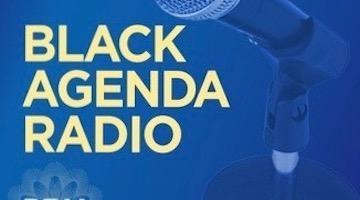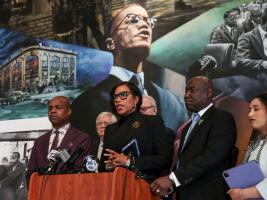There is nothing strange about Black folks laughing at the sheer immensity of ways we can die.
“Revolutionary laughter is a survival tactic that opens up space for Black life.”
In this series, we ask acclaimed authors to answer five questions about their book. This week’s featured author is Danielle Fuentes Morgan. Morgan is Assistant Professor in the Department of English at Santa Clara University. Her book is Laughing to Keep from Dying: African American Satire in the Twenty-First Century.
Roberto Sirvent: How can your book help BAR readers understand the current political and social climate?
Danielle Fuentes Morgan: Laughing to Keep from Dying offers a frame for understanding Black life within a twenty-first-century context; it takes particular hold in the midst of Black Lives Matter and the Movement for Black Lives, where it feels like there are so many ways to die, and so many deaths (bodily, psychic) with which to contend. Laughing to keep from dying is revolutionary laughter and a survival tactic that opens up space for Black life by asserting Black resiliency, Black selfhood, and Black autonomy. However, to understand its present-day efficacy, we must also acknowledge its historical roots. Comedy more broadly has historically been used as both an offensive and defensive mechanism against potential traumas and loss of life. This is especially true in satire, a mode where the satirist needs clear aim and rhetorical specificity, and can enact plausible deniability if needed. This sort of critical utility in African American culture dates back to the antebellum era, and it has been revamped contemporarily. Satire has always been predominant and popular as a way to speak truth to power in African American cultural production, and it’s this connection to both the historical that makes it so useful in responding to the repeating and rhyming frustrations of the twenty-first century.
“Satire has always been predominant and popular as a way to speak truth to power in African American cultural production.”
This sense of frustration is also connected to what I describe as the self-satirization of the contemporary moment, or the way the twenty-first century seems to double over onto itself and anticipate the absurd before the fictional satire can be deliberately constructed. Thinking about it another way, how can we create satire when the world is already self-satirizing? The world right now verges on the unbearably absurd; we are in the midst of distressing, uncanny times. How does satire operate within the realm of the already absurd? In some instances, it operates through reading the self-satirization of the world through satirical lenses and in consideration of satirical tropes — by acknowledging the self-satirization of real life, we are able to re-center ourselves and disempower the oppressive forces that would otherwise gaslight us into believing that our discomfort is our own fault.
What do you hope activists and community organizers will take away from reading your book?
A friend once told me “The frontline is where you make it,” so I think it’s critical for us to remember that activism makes space for and is strengthened by a variety of skill sets. I hope activists and community organizers will be encouraged to remember that activism can take a variety of forms and be enacted in various terrains — the reciprocal nature of art and activism is key here. This is especially important to keep in mind now during the COVID-19 pandemic where many of us are by means isolated and homebound, although I certainly did not anticipate this particular relevance when writing the book. The reciprocal nature of art and activism is key here. Activism inspires art, to be sure, and art often inspires the activism itself. Art is activism. The potential of satire as a form of activism, as a way to fight for Black lives and Black people, cannot be understated. In fact, there is a long tradition of African American satire as activism. I am always reminded of Frederick Douglass’s speech, “What to the Slave is the Fourth of July?” and his assertion that “scorching irony, not convincing argument, is needed.” Here Douglass acknowledges the necessity of irony, and later of “withering sarcasm,” as a mode that might compel his listener to take action. The satiric is not now nor has it ever been superfluous; it is critical in art as activism.
We know readers will learn a lot from your book, but what do you hope readers will un-learn? In other words, is there a particular ideology you’re hoping to dismantle?
I want readers to recognize the skillfulness of the satirist and also the intentionality of satire, to realize that satire and comedy make meaning. I want readers to grapple with the untenability of “just jokes” as an ideology, even if claimed by the satirists themselves. Certainly insisting that satire is “just jokes” or that the satirist is “just kidding” can offer a necessary veil of plausible deniability when speaking truth to power, but it should not be used to undermine the substance of the jokes or of joking itself. So often there is an effort to dismiss the significance of comedy through claims of “just jokes” or the implication that jokes are somehow inconsequential. This is fallacious thinking – jokes do not emerge in a vacuum. It is only through the recognition of the social sphere that a comedian or a satirist can enact comedy. To do this, we must be critical not only of the art itself but of our responses to the art. Our laughter derives from our expectations going unmet or by our expectations being met in a surprising way. When satire is effective it’s precise, and we perceive the fundamental truth within the absurdity of the satirical articulation and support the critique being waged.
I’d also say, Laughing to Keep from Dying focuses on the necessity of “punching up” -- a frame in which the satirist locates their comedic impulse or critique on individuals or institutions with higher status or more privilege than their own. This idea of “punching up” has been a key feature in African American comedy since its inception and, while it surely takes more effort than less specific satire, its socio-political impact may be more refined.
“Our laughter derives from our expectations going unmet or by our expectations being met in a surprising way.”
More broadly, I want readers to grapple with the unsustainability of “the post-racial.” It’s interesting, writing about the myth of the post-racial in 2020. With very few exceptions, people aren’t holding onto that belief anymore. Even people who wanted to believe in the post-racial as some sort of utopia have been disabused of that notion. What I really hope to dismantle instead is the idea of the “post-racial” as harmless or desirable, as it problematizes race rather than racism, and seems to suggest that if we could only “move beyond” race we could somehow achieve actualization. But how could actualization possibly exist for Black people without a clear understanding of and love for Blackness in its various forms and manifestations and ways of being? Why should Blackness be muted for utopia to exist? Twenty-first-century African American satire opens up space for Black self-love, Black joy, Black identities, and Black utopia. The “post-racial” was never going to save Black people, but salvation might be found in a deeper understanding of Black interior life and the multitudes Black selfhood contains.
Who are the intellectual heroes that inspire your work?
I’m inspired by writers and thinkers who give us the language to speak for ourselves and who don’t feel the need to quiet or mask their own voices in favor of bland academese. When I write at my desk, I have photos of Zora Neale Hurston and James Baldwin over my shoulder. I am inspired by their refusal to separate theory and practice and how this interstice opens up new possibilities for readers. They speak to our individual and communal lived experiences. Hurston’s interdisciplinarity demonstrated to me early on that our passion illuminates the purpose in our writing. So often we are told to extinguish that flame in favor of impartiality or some feigned unbiased approach. Hurston’s work unapologetically centered herself and her people. She wrote about us and for us, and never seemed to question in her own mind the validity of that focus. In “How It Feels to Be Colored Me” she says, “Sometimes I feel discriminated against, but it does not make me angry. It merely astonishes me. How can any deny themselves the pleasure of my company? It’s beyond me.” I think about that quotation often as I write, and what that might signal now, almost 100 years after she first wrote it. There’s an assumption not only that Black people are boxed in by the trauma of racism but that racism defines Black thinking, Black life, and Black work. For me, what’s so brilliant about Hurston’s statement here is the casualness with which she shrugs off racism onto the shoulders of the racist -- it’s their problem, not hers.
James Baldwin wrote with an emotional precision that continues to inspire me. The sort of sermonic cadence with which he writes feels like home. His writing, both fiction and nonfiction is so prescient and helps me to unearth new layers of understanding about myself and about the world around me. I am always drawn back. More contemporarily, I am grateful for the work of Daphne Brooks, Margo Crawford, Darryl Dickson-Carr, Glenda Carpio, Mel Watkins, Tressie McMillan Cottom, Brittney Cooper, and Dagmawi Woubshet, writers who deftly blend and traverse genres and defy boundaries to render the popular scholarly, the scholarly popular, and whose incisive writing continues to take us higher.
In what way does your book help us imagine new worlds?
I hope this book helps readers to imagine a new world where we recognize that Black futures are inextricably connected to the Black past and present. This requires a move away from the inaccurate and offensive ideology of “I am not my ancestors” and deliberately into an acknowledgement that, if we are fortunate, we are our ancestors. We often derive misplaced comfort in looking at the traumas of the past – slavery in particular – and thinking “That could never be me” or “I would’ve resisted; I would’ve fought.” Any new worlds will require us to recognize ourselves in the old worlds, and recognize that the new worlds and old worlds overlap; we need to recognize that our ancestors did resist and they did fight, and it’s only due to their resistance and their fight that we have a template for our own revolutionary impulses today.
This sense of ancestral revolution is clear when we examine the trajectory of African American cultural production writ large. Within the context of African American comedy, I want us to imagine a world where the genre is understood to be the insightful, groundbreaking, and critical cultural artform that it is and always has been. I want to recognize in the contemporary realm the sophisticated remixes and rhymes of the past.
Roberto Sirvent is Professor of Political and Social Ethics at Hope International University in Fullerton, CA, and an Affiliate Scholar at Yale University’s Interdisciplinary Center for Bioethics, where he directs the Race, Bioethics, and Public Health Project. He is co-author, with fellow BAR contributor Danny Haiphong, of the book, American Exceptionalism and American Innocence: A People’s History of Fake News—From the Revolutionary War to the War on Terror.
COMMENTS?
Please join the conversation on Black Agenda Report's Facebook page at http://facebook.com/blackagendareport
Or, you can comment by emailing us at comments@blackagendareport.com



















